Gambling and mathematics have an undeniable relationship that has existed since the existence of both. Everyone understands that gambling gets its concepts from mathematics. But did you know that gambling has aided the development of some mathematical theories? These theories have been applied in other sectors leading to a solution to complex problems. Hence, the relationship is even more mutual than you would expect.
Some of the theories developed from gambling games include the Monte Carlo method and the chaos theory. Gambling, on the other hand, uses several mathematical terms to illustrate them. For slots such as Gold of Sirens, you will find RTPs and volatilities, which borrow heavily from math. There is also a deep relationship between gambling and mathematical concepts. Let us dig into them:
Probability and Gambling
The whole concept of gambling is based on probability. Whenever you place a bet, you are simply putting your money on the probability of a certain outcome appearing. You should always have this deep in your head when playing your favorite games. The odds are usually the biggest when the probability of getting the correct outcome is the lowest.
Different types of probability come to play when gambling. They include the following:
- Marginal Probability
- Joint Probability
- Conditional Probability
The first one illustrates that the chances of getting an outcome are irrespective of other activities while joint probability is when outcomes happen simultaneously. Conditional probability, on the other hand, is when the likelihood of an outcome happening is influenced by the occurrence of another event. It plays a huge role, especially in gambling card games.
The probability is used to calculate the risks involved for both casino and the players. The house usually ensures that the house edge is highest meanwhile the probability is lowest. However, such bets usually have a lot at stake.
It is also the wisdom behind mega jackpots in sportsbooks. The casinos will expect you to make correct predictions in ten to thirteen games where the result could be a win, loss, or draw. The probability of getting all of them correctly is quite low. Hence, the casino can put huge sums of cash at stake.
Expected Value
This is another mathematical concept that is heavily applied in gambling. It is used to determine the average of what to expect to win or lose when betting if the bets with the same odds are replicated over a certain period. The expected value simply puts two things together, the value of the bet and the likelihood of the event happening.
It sounds complex, but it is simple. There is a formula that is used to get the expected value. For instance, American roulette has 38 pockets in total, one to 36, and two zero pockets. Hence, the chance of winning when you bet on a certain number is 1/38. If you bet on number 7 and place a wager of $5, you are likely to win $175 if you are successful. If you fail, then the house will simply take your money. However, it is a fact that the ball has a higher likelihood of landing on the rest of the numbers.
Therefore, using the formula, you will realize that you are expected to lose an average of 26 cents if you stick to a particular bet over time. The expected value puts together the expected value of winning and the expected value of losing.
The Law of Large Numbers
This mathematical concept also has an application in gambling. It states that as the number of identically distributed randomly generated variables increases, their sample average approaches the theoretical average. The problem with math is that it looks very complex when put in words but gains simplicity when illustrated.
For this one, when revealing the color of hidden cards, there is a 50/50 chance of landing a red or black card. If you revealed ten different cards, you may land seven red cards and three black cards, which is a 70/30 result. However, if you continue playing and then reveal ten more, the value is likely to move closer to 50/50.
Hence, if you want to move closer to the expected outcome, you have to try more. This law is used frequently in gambling. It is also applied when showing why the RTP of a certain game may not be significant when playing for a few rounds. However, when you play more, you will realize the difference between a slot with a 94% RTP and one with 97%.
These are three mathematical theories that are applied in gambling. However, it does not matter because all casinos are designed to ensure that the house wins eventually. Hence, gamblers play for fun, and not because the odds are in their favor. It is never about math.

